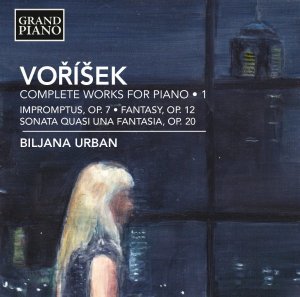Although he died at age 34, Bohemian composer Jan Vaclav Voríšek (1791-1825) lived a full and productive life. He studied and practiced law, became a court organist, met his idol Beethoven and befriended Schubert (he also knew Spohr and Moscheles), and gained renown for his compositions as well as for his piano virtuosity.
Perhaps Voríšek was a little bit of a hustler, yet his musical talent substantiated his energy and ambition. Certainly his existing piano works are some of the most engaging and imaginative of their time. They resemble Schubert in the sense that ideas are allowed plenty of room for thematic detours and harmonic surprises, while musical ends govern the shape of virtuoso passagework rather than potential superficial effect.
The first volume of what promises to be a complete Voríšek cycle reveals pianist Biljana Urban to be a generally lyrical and soft-grained interpreter, similar in manner if not in detail to Radoslav Kvapil in his 1974/75 Supraphon cycle and 1993 Unicorn remakes, as opposed to the more ardent, incisive style favored by Artur Pizarro or fortepianist Olga Tverskaya.
Compare the leisurely pace, rhythmic distensions, and disarming melodic shaping of Urban’s G major Impromptu (Op. 7 No. 2) to Pizarro’s quicker, rhythmically straightforward reading; or notice the fanciful inner voices and rhapsodic trajectory of her D major Impromptu (Op. 7 No. 3) in relation to Pizarro’s firmer and faster symmetry. She fares best in the Op. 12 Fantasy, whose loose-limbed style and astonishing modulations can absorb Urban’s casual gait, although here I prefer Kvapil’s finely tuned dynamics and pedaling.
However, Pizarro’s virtuosic stamina and dynamism remains superior in the three-movement Sonata. He observes the Scherzo’s syncopated accents that Urban ignores, while her sensitive yet basically languid way with the finale’s demanding runs and sequences cannot compare to Pizarro’s scintillating and supple reading, let alone Tverskaya’s fiery fingerwork. The sonics are resonant to the point of spongy, but if Urban’s Voríšekian aesthetic holds appeal, Allan Badley’s superbly written and researched annotations are worth the price of admission.
































